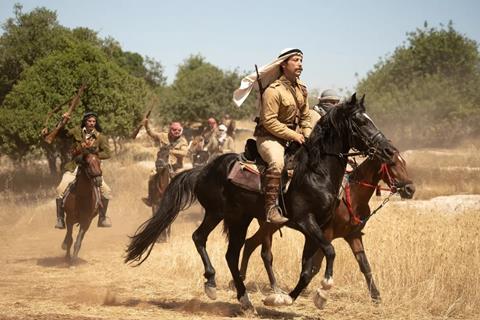Jacir’s lavish period epic is set against the background of Palestine’s 1936 Arab Revolt against British rule

Dir/sr: Annemarie Jacir. Palestine/UK/France/Denmark/Norway/Qatar/Saudi Arabia/Norway/Jordan. 2025. 118mins
History repeats itself – so why not learn from it? That’s the main takeaway from Annemarie Jacir’s stirring historical epic set against the background of the 1936 Arab Revolt against British rule in Palestine. Selected as Palestine’s official Oscar entry – as were all three of Jacir’s previous full-length features – Palestine 36 is an old-fashioned pleasure in some ways, with its readily identifiable heroes and villains, quaint colourised archive footage, action sequences set in Biblical landscapes and sentimental moments of village warmth. But it’s also a passionate, timely and thoughtful story about the roots of the Israeli-Palestinian conflict that audiences will view through a contemporary lens.
A passionate, timely and thoughtful story about the roots of the Israeli-Palestinian conflict
Having premiered in Toronto and now playing London, Palestine 36 has sold to a raft of territories including the UK (Curzon), France (Haut et Court) and North America (Watermelon Pictures, a distributor founded in April 2024 with a mission to amplify Palestinian narratives). The film is Jacir’s most ambitious feature to date (following 2008’s Salt Of This Sea, 2012’s When I Saw You and 2017’s Wajib); a sweeping character-led tapestry that could be seen as a delayed Palestinian response to Lawrence of Arabia or Otto Preminger’s Exodus. It could have substantial appeal to curious general audiences, including those unmotivated by political sympathies. It is also likely to do well in Middle Eastern territories, where MAD Distribution handles sales.
The film is divided into chapters separated by segments from genuine period newsreels, which have been colourised. The film’s first chapter ‘The Year You Were Born’ unfolds in 1936, and a plummy British announcer explains, over scenes of Jewish immigrants arriving on crowded passenger ships, that “millions of Jews all over the world were promised a national home in Palestine by Britain’s Lord Balfour”. The 1917 Balfour Declaration was the first public expression of support for Zionism by a national government. From 1920 onwards, after the defeat of the Ottoman Empire, British occupation forces in what was then known as Mandatory Palestine found themselves having to enforce it – some enthusiastically, some less so.
The see-saw is rather literally incarnated here in three British administrators based on real historical figures: sadistic, cynical, pro-Zionist Captain Wingate ( Robert Aramayo); sympathetic, well-meaning pro-Arab diplomat Thomas Hopkins (Billy Howle); and weary army careerist and High Commissioner for Palestine, Arthur Wauchope (Jeremy Irons), whose attempts to take the middle ground are as solid as the smoke from the cigarettes he nervously sucks at.
Yet these are colonial bit players in a story anchored in a series of Palestinian stories – significantly, these are both Christian and Arab. Saleh Bakri, a regular Jacir collaborator, plays Khalid, an idealistic young man from the countryside who is hired as a chauffeur in Jerusalem by wealthy newspaper publisher Amir (Dhafer L’Abidine). The luxurious Western lifestyle of Amir and his liberated feminist partner and pro-Arab columnist Khuloud (Yasmine al Massri) adds political nuance to a film that does not shy away from class and clan divisions within Palestine society – or paper over the fact that certain elite Muslim associations, like the one for which Amir serves on the board, were actually Zionist-funded.
Palestine 36’s heart is, however, in the villages, cotton fields and olive groves where the resistance to British rule is shown to take root – and where Khalid soon returns to take up arms and join the rebels. Guerilla bombings, brutal British reprisals and one episode of Jewish settler violence do not overbalance a film that finds its emotional centre in the friendship between two pre-adolescent children: Kaleem (Ward Helou) – a shoe-shine boy who is the son of a Christian priest – and his Muslim playmate Afra (Wardi Eilabouni), whose family-matriarch grandmother (an intense Hiam Abbas), teaches her to be proud of who she is and where she’s from. An Ottoman-era pistol becomes the plot’s Macguffin but it’s a well-chosen one, with its suggestion that colonialists come and go but the problems they bequeath do not.
Jacir’s script moves with pace and verve, sometimes startlingly so, from character to character and strand to strand, gradually revealing their interconnections. It’s lovingly shot within a surprisingly green landscape, with textured costuming. Ben Frost’s soundtrack, which draws on Arabic melodies, tunings and traditional instruments, is sparingly used for emotional effect; indeed, Palestine 36 also knows how powerful silence can be.
Production companies: Philistine Films, Autonomous, Corniche Media, MK Productions, Snowglobe
International sales: Lucky Number, hello@luckynumber.fr / mk2 intlsales@mk2.com/
Producers: Ossama Bawardi, Ossama Bawardi, Cat Villiers, Azzam Fakhreddin, Hani Farsi, Nils Åstrand, Olivier Barbier, Nathanaël Karmitz, Katrin Pors, Hamza Ali
Cinematography: Hélène Louvart
Production design: Nael Kanj
Editing: Tania Reddin
Music: Ben Frost
Main cast: Hiam Abbass, Kamel Al Basha, Yasmine Al Massri, Jalal Altawil, Robert Aramayo, Saleh Bakri, Yafa Bakri, Karim Daoud Anaya, Wardi Eilabouni, Ward Helou, Billy Howle, Dhafer L’Abidine, Liam Cunningham, Jeremy Irons
























